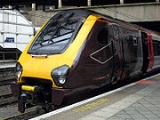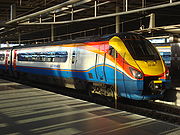
Bombardier Voyager family
Encyclopedia
The Voyager series is a group of express
diesel-electric multiple-unit trains built by Bombardier Transportation
for service on the UK railway network.
. With Virgin's loss of the Cross Country franchise, these were all transferred to the new operator CrossCountry
in November 2007.

The Class 221 Super Voyager was built as a tilting version of the Class 220. Although visually similar, the majority of these trains have five cars instead of four, and have been fitted with a tilting
mechanism similar to that on the Class 390
EMU. 44 sets were constructed for use by Virgin Trains; of these, 23 have been transferred to CrossCountry with the remaining 21 being retained by Virgin, for use on parts of their West Coast franchise. None of the CrossCountry
class 221s now requires tilt since the services were withdrawn from the West Coast Main Line
, and their tilting equipment has therefore been removed to improve reliability.

The Class 222 "Meridian" DEMUs are broadly similar to the original Voyager units, but feature a number of reliability improvements and different internal layout.
The Class 222 was built in the light of experience gained with the 220 and 221 units; in particular, many more components were installed under the floor so as to increase space for passengers. A total of 27 sets were constructed initially:
EDMUs). Additional pantograph vehicles would be manufactured at Bombardier Transportation's Derby plant, and 21 trainsets converted, at a cost of approximately £300million. The proposal was named Project Thor.
High Speed Train
There are three types of trains in Britain that have been traditionally viewed as high speed trains:* Advanced Passenger Train - Tilting trains which never entered into regular revenue-earning service....
diesel-electric multiple-unit trains built by Bombardier Transportation
Bombardier Transportation
Bombardier Transportation is the rail equipment division of the Canadian firm, Bombardier Inc. Bombardier Transportation is one of the world's largest companies in the rail-equipment manufacturing and servicing industry. Its headquarters are in Berlin, Germany....
for service on the UK railway network.
Class 220
The Class 220 Voyager was built to operate Cross Country intercity services. 34 four-car sets were built between 2000 and 2001 and operated by Virgin TrainsVirgin Trains
Virgin Trains is a train operating company in the United Kingdom. It operates long-distance passenger services on the West Coast Main Line between London, the West Midlands, North West England, North Wales and Scotland...
. With Virgin's loss of the Cross Country franchise, these were all transferred to the new operator CrossCountry
CrossCountry
CrossCountry is the brand name of XC Trains Ltd., a British train operating company owned by Arriva...
in November 2007.
Class 221

The Class 221 Super Voyager was built as a tilting version of the Class 220. Although visually similar, the majority of these trains have five cars instead of four, and have been fitted with a tilting
Tilting train
A tilting train is a train that has a mechanism enabling increased speed on regular rail tracks. As a train rounds a curve at speed, objects inside the train experience centrifugal force. This can cause packages to slide about or seated passengers to feel squashed by the outboard armrest due to...
mechanism similar to that on the Class 390
British Rail Class 390
The Class 390 Pendolino is a type of train used in Great Britain. They are electric multiple units using Fiat's tilting train pendolino technology and built by Alstom. Fifty-three 9-car units were originally built for Virgin Trains from 2001 to 2004 for operation on the West Coast Main Line , with...
EMU. 44 sets were constructed for use by Virgin Trains; of these, 23 have been transferred to CrossCountry with the remaining 21 being retained by Virgin, for use on parts of their West Coast franchise. None of the CrossCountry
CrossCountry
CrossCountry is the brand name of XC Trains Ltd., a British train operating company owned by Arriva...
class 221s now requires tilt since the services were withdrawn from the West Coast Main Line
West Coast Main Line
The West Coast Main Line is the busiest mixed-traffic railway route in Britain, being the country's most important rail backbone in terms of population served. Fast, long-distance inter-city passenger services are provided between London, the West Midlands, the North West, North Wales and the...
, and their tilting equipment has therefore been removed to improve reliability.
Class 222

The Class 222 "Meridian" DEMUs are broadly similar to the original Voyager units, but feature a number of reliability improvements and different internal layout.
The Class 222 was built in the light of experience gained with the 220 and 221 units; in particular, many more components were installed under the floor so as to increase space for passengers. A total of 27 sets were constructed initially:
- Midland MainlineMidland MainlineMidland Mainline was a British train operating company owned by the National Express Group and based in Derby. It was created after the privatisation of British Rail. Midland Mainline services operated from April 1996 to November 2007....
originally ordered 23 sets, which it named as "Meridians", to enter service in 2004, replacing TurbostarTurbostarTurbostar is the name given to a family of diesel multiple units built by Bombardier Transportation at their Litchurch Lane Works in Derby, England...
trains which it had previously used. On entry into service, Midland Mainline received a mix of four- and nine-car units, later re-formed into a combination of four-, five- and eight-car units. All Midland Mainline's units were transferred to the new franchise holder East Midlands TrainsEast Midlands TrainsEast Midlands Trains is a British passenger train operating company. Based in Derby, it provides train services in the East Midlands, chiefly in the counties of Lincolnshire, South Yorkshire, Nottinghamshire, Leicestershire, Derbyshire and Northamptonshire, and between the East Midlands and London...
(EMT) in November 2007. When EMT took over the franchise, it removed a car from six of its eight-car sets, to lengthen previously four-car units. The last remaining eight-car unit was reduced to five cars. , seventeen sets were five-car formations used for stopping services to and from London.
- First Hull Trains obtained four 4-car Class 222 units in 2005 and named them "Pioneers". These were to replace the Turbostars that had provided Hull Trains' initial services. These units are slightly different internally from the Meridian trains. Following a maintenance incident and the long-term unavailability of one unit, First Hull Trains replaced its Class 222 fleet with a fleet of Class 180 AdelantesBritish Rail Class 180The Class 180 is a type of British diesel multiple unit train built by Alstom between 2000 and 2001 for use on then-new express services by First Great Western . They were built at Washwood Heath in Birmingham and are part of the Coradia 1000 family along with the Class 175. FGW stopped using the...
in 2009. The Class 222 units have been transferred to EMT for use with the rest of the Class 222 fleet and on new services between London and Corby. These "Pioneers" are now known as "Meridians".
Proposed conversion to electrical operation
In 2010 Bombardier proposed the conversion of several Voyager multiple units into hybrid diesel and electric vehicles capable of taking power from an overhead pantograph (electro-dieselsElectro-diesel locomotive
An Electro-diesel locomotive is powered either from an electricity supply or by using the onboard diesel engine...
EDMUs). Additional pantograph vehicles would be manufactured at Bombardier Transportation's Derby plant, and 21 trainsets converted, at a cost of approximately £300million. The proposal was named Project Thor.

